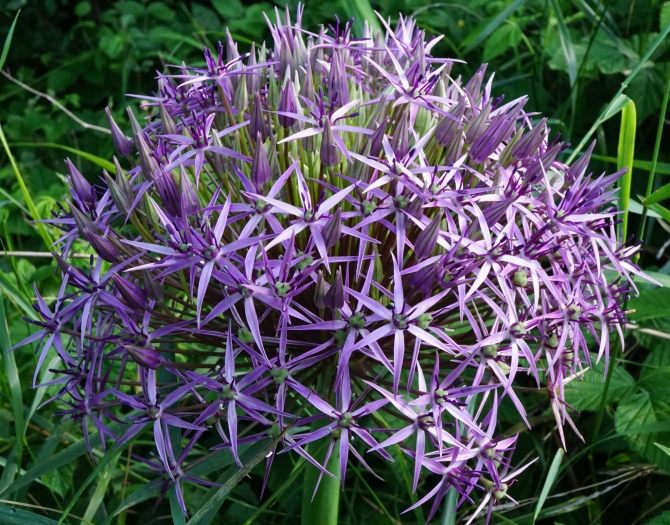Star Of Persia
(Allium cristophii)
Star Of Persia (Allium cristophii)
/
/

Patrick Hacker
CC BY 4.0
Image By:
Patrick Hacker
Recorded By:
Copyright:
CC BY 4.0
Copyright Notice:
Photo by: Patrick Hacker | License Type: CC BY 4.0 | License URL: http://creativecommons.org/licenses/by/4.0/ | Rights Holder: Patrick Hacker | Publisher: iNaturalist | Date Created: 2020-06-12T17:32:47-07:00 |



























Estimated Native Range
Summary
Allium cristophii, commonly known as Star of Persia, is a deciduous perennial bulb native to rocky slopes and dry meadows in Central and Southwest Asia, particularly Iran and Turkey. It reaches a height of up to 50 cm (20 in) and is notable for its large, spherical umbels of silvery pink star-shaped flowers, each umbel measuring 20–25 cm (7.9–9.8 in) in diameter, blooming in early summer. The flowers are highly ornamental and are followed by equally attractive fruiting clusters. The foliage is basal, with broad, strap-shaped leaves that die back before flowering. Star of Persia is valued for its striking floral display and architectural form.
This Allium species is favored for its ease of maintenance and drought tolerance, making it suitable for rock gardens, borders, and cottage gardens. It is also used for cut flowers and dried arrangements due to the persistent beauty of its seed heads. A. cristophii thrives in full sun to part shade and requires well-drained, sandy or gritty soil. It is hardy in USDA zones 5–8 and benefits from a dry period in late summer when the bulb is dormant. Caution should be taken as it is toxic to cats, dogs, and horses. The plant has been recognized with the Royal Horticultural Society’s Award of Garden Merit for its outstanding qualities.CC BY-SA 4.0
This Allium species is favored for its ease of maintenance and drought tolerance, making it suitable for rock gardens, borders, and cottage gardens. It is also used for cut flowers and dried arrangements due to the persistent beauty of its seed heads. A. cristophii thrives in full sun to part shade and requires well-drained, sandy or gritty soil. It is hardy in USDA zones 5–8 and benefits from a dry period in late summer when the bulb is dormant. Caution should be taken as it is toxic to cats, dogs, and horses. The plant has been recognized with the Royal Horticultural Society’s Award of Garden Merit for its outstanding qualities.CC BY-SA 4.0
Plant Description
- Plant Type: Bulb
- Height: 1-2 feet
- Width: 0.5-1.5 feet
- Growth Rate: Moderate
- Flower Color: Purple
- Flowering Season: Spring
- Leaf Retention: Deciduous
Growth Requirements
- Sun: Full Sun
- Water: Low, Medium
- Drainage: Medium
Common Uses
Bee Garden, Bird Garden, Border Plant, Butterfly Garden, Deer Resistant, Drought Tolerant, Fragrant, Hummingbird Garden, Low Maintenance, Potted Plant, Rabbit Resistant, Rock Garden, Showy Flowers, Street Planting
Natural Habitat
Native to rocky slopes and dry meadows in Central and Southwest Asia
Other Names
Common Names: Persian Onion, Stäpplök
Scientific Names: , Allium cristophii, Caloscordum cristophii,
GBIF Accepted Name: Allium cristophii Trautv.